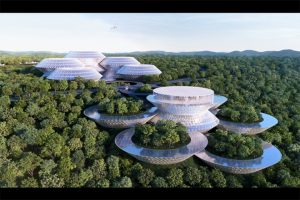After a heated bidding race to see who will host the first 3 casinos to be built in Japan, the island of Hokkaido is having second thoughts on the whole idea. According to government sources, residents of Japan’s northernmost main island are speaking out against a casino resort due to the environmental impact of such a venture.
After the Japanese government voted last year to allow integrated resorts (IR) which offer gambling, several cities announced their desire to host the first of these megaresorts. As the government is initially offering only 3 casino licenses, competition among host cities and foreign casino developers has been fierce. But residents of some Japanese prefectures are concerned that the negative environmental impact of a megaresort sours the potential profits from such a venture.

Environmental Concerns

The Hokkaido Prefecture had previously chosen the city of Tomakomai as a potential site for the proposed IR in the region. However, concerns over the environmental impact of a large scale casino resort has led to citizens’ groups raising 20,000 signatures in petition against the plan. According to a recent survey by the Hokkaido government, two-thirds of respondents are worried about hosting a casino resort.
Concerned residents of Tomakomai cite its proximity to Lake Utonai, a protected wildlife sanctuary nearby. The area is also on an international list of important wetlands.
As it takes around 3 years for the government to conduct an environmental impact survey of the region, business interests in the region worry that it won’t be completed in time to apply for the casino license. The Tomakomai assembly unanimously backs a casino plan in order to create new jobs and boost the local economy.
Hokkaido Governor Naomichi Suzuki told the local media that they are in the process of making a final decision.
“We haven’t reached a conclusion yet. We’ll make a decision after due consideration,” Suzuki said.
The Contenders

The Japanese government legalized gambling in 2018, and the country’s 47 prefectures and 20 major cities are all eligible to apply for the first of 3 casino licenses on offer. So far, several cities have raised their voices in favor of hosting an IR casino, with several dropping out of the race along the way.
The list of Japanese cities and prefectures which have expressed interest thus far include the prefectures of Hokkaido, Osaka, Nagasaki, Wakayama, and the cities of Tokyo, Osaka city, Chiba city, and Yokohama.
The Japanese government requires that any proposed IR needs to be larger than existing Tokyo hotels, and must include a convention center with a capacity for at least 3,000 people in a 60,000-square-meter exhibition space. The requirements are part of a larger plan to attract more than 60 million international travelers from abroad by 2030.
The government is also imposing restrictions on Japanese citizens who choose to visit IRs, including limited admission and high entrance fees to deter regular attendance. The government seeks to limit exposure to the potential risks of gambling addiction. Japan already houses 58% of the world’s gaming machines in their pachinko halls.
The competition among Japanese cities is rivaled only by the bidding war among international casino developers. MGM Resorts, Las Vegas Sands, and Wynn Resorts are among the list of major players vying for the coveted Japanese casino licenses.
All actors in the grand play to develop the gaming industry in Japan are hoping to cash in on the lucrative Asian gambling tourism market, which pumps billions of dollars per year into gaming meccas like Macau. Casino resort powerhouse Macau takes the lion’s share of profits from Chinese gambling tourists hoping to escape China’s draconian anti-gambling laws. And Japan hopes to cash in.
A new sun is rising over the Asian seas, and when Japan is done hemming and hawing over the casino issue, international gamblers will have a new destination.
Disclaimer: All images are copyright to their respective owners and are used by USA Online Casino for informational purposes only.












